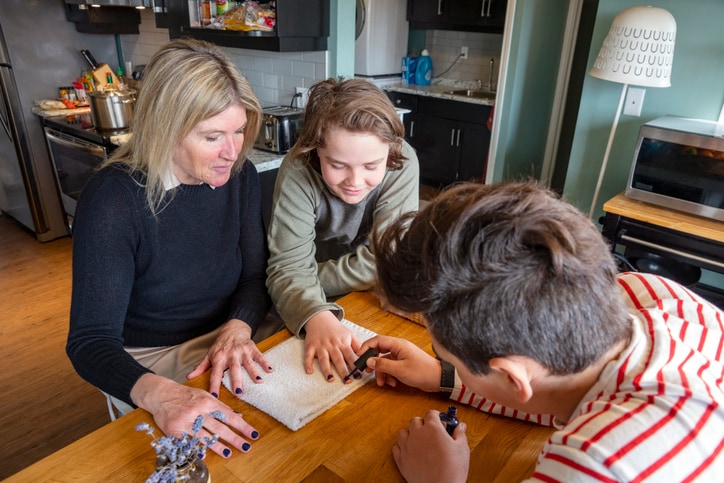If you’re looking for a job at a day care center, you likely know there are plenty of options out there. Some centers adhere to a particular child development philosophy. Some are larger institutions, while others are focused on small-scale in-home care. There’s a different type of day care for every type of child — and every type of child care worker, too.
So how do you figure out what center is best for you? A lot depends on your own personality and work style. But there are also a few common red flags, such as high employee turnover rate. They key is asking the right questions before you take on a job.
“When you’re coming in to interview, you’ll get a feel for the center… you’ll know if you have a good feeling as you walk through,” says Angela Wolfe, owner of Children’s Lighthouse of Little Elm, Texas, who’s now in the process of opening a second location. “Also, ask a lot of questions.”
If you’re passionate about early childhood education, you want to find a place that feels right — that makes you proud to work there, that challenges you (in a good way), respects you and helps you grow as a caregiver and teacher. Here’s what you should be on the outlookout for and ask about to ensure you achieve that in a new job.
Assess the facility
As you check out the day care and its grounds, you’ll get a feel for the place, how it’s run and what type of environment it provides kids — and its employees.
“Every center is different and will have different things to offer employees, so think about what you feel would be a good fit for you personally,” says Sabrina Walters, director of U-GRO Learning Centres in York, Pennsylvania. “For example, a smaller family owned center versus a larger corporate center. You can also search inspection records on some state’s websites to find out which centers near you fair better during regulatory inspections, which may be an indicator of higher quality.”
Also ask yourself:
-
How large are the classrooms and how much natural light shines in the rooms?
-
What equipment and supplies are available for activities and play?
-
How many children are in each room, and how many teachers are with them?
-
Do employees seem cool and calm or harried and frazzled?
-
Do I feel cool and calm here or harried and frazzled?
-
Has time and care been taken to make sure the place is cheerfully decorated and aesthetically pleasing for children?
-
Do surfaces appear clean and tidy?
-
How organized are the supplies and toys?
-
Do children seem generally happy and comfortable here? Of course, there will be criers, but what’s the overall body language of the kids?
-
What tone of voice are teachers using when talking to the kids? Are they getting down at kids’ eye level to talk with them?
Understand company rules
You’ll also want to know what would be expected of you, as an employee. A few things you might want to ask the director during your interview:
-
What should employees wear on the job?
-
What are the sick day and personal day policies?
-
Do you have a company handbook that I can read over?
-
Will I need to go through training and/or continuing education while working here?
-
Do you help employees earn a Child Development Associate (CDA) credential and/or help pay for education that could help me advance my career in early childhood education?
Ask about learning philosophies and classroom procedures
“Choosing the right work environment depends on your educational philosophy,” says says Amy James, franchise owner of Primrose School of Nashville Midtown and Primrose School of Brentwood in Tennessee. “If you are someone looking to teach with an established curriculum and learn how to assess children’s needs, then you should look for a larger, accredited school with more guidance from teachers. If you are looking to let the children learn independently with minimal teaching, you should look for a provider that encourages exploration and purposeful play. If you’re interested in taking care of infants and toddlers, a provider with younger ages or in-home service may be best for you.”
If you’re starting out, it might be hard to think of yourself as having an educational philosophy, but if you dig a little deeper, you’ll realize you probably do. Just ask yourself what’s really important to you as a teacher, says Walters.
“For example, if you want to help children prepare for kindergarten academics, then you should probably seek out employment in a center that promotes academic readiness as one of its goals,” Walters says. “Whether the center is big or small, if you don’t feel comfortable with what you’re being asked to teach, it won’t feel like a good fit.”
You may be able to do a little research on the day care center’s curriculum by checking out its website, but you can probably find out a whole lot more just by asking a few questions. Here are some ideas of what to ask:
-
How would you describe the curriculum and/or teaching philosophy?
-
What are the main ways kids learn here? Are they doing mostly worksheets or are there a lot of hands-on learning techniques?
-
What does the kids’ daily schedule look like?
-
How do teachers typically communicate with the parents?
-
How much playtime to the kids get, and what do they do?
-
What do the children do when it’s too cold or rainy to play outside?
-
What disciplinary strategies are used when children misbehave?
Align on pay and benefits
Obviously, before accepting any job, you’re going to ask how much you’ll get paid, whether or not there will be paid time off and/or overtime and what benefits will be available to you. You may also ask about promotions and raises and how often they tend to be given and why.
Once you’re done asking your potential boss your most pressing questions, don’t be afraid to ask to meet a few employees, as well. After all, being happy at work means being happy with your coworkers, and their demeanor and answers to your questions can really give you a feel for what it’s like to be an employee there.
“Ask about team morale and how long other teachers have been there,” says Wolfe. “Sometimes you can get a good feeling about a center by meeting some people that work there, so go talk to people. I know we would welcome that.”
Read next: Raising the voices of caregivers







